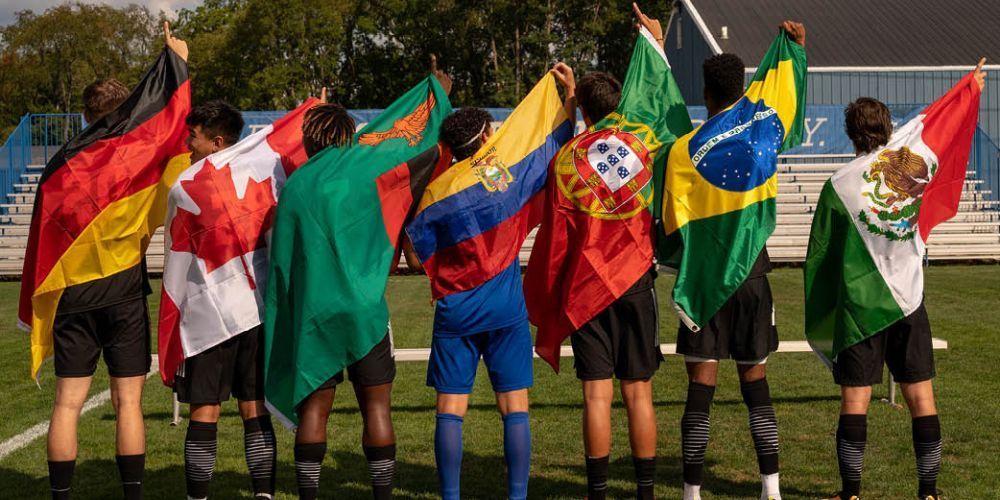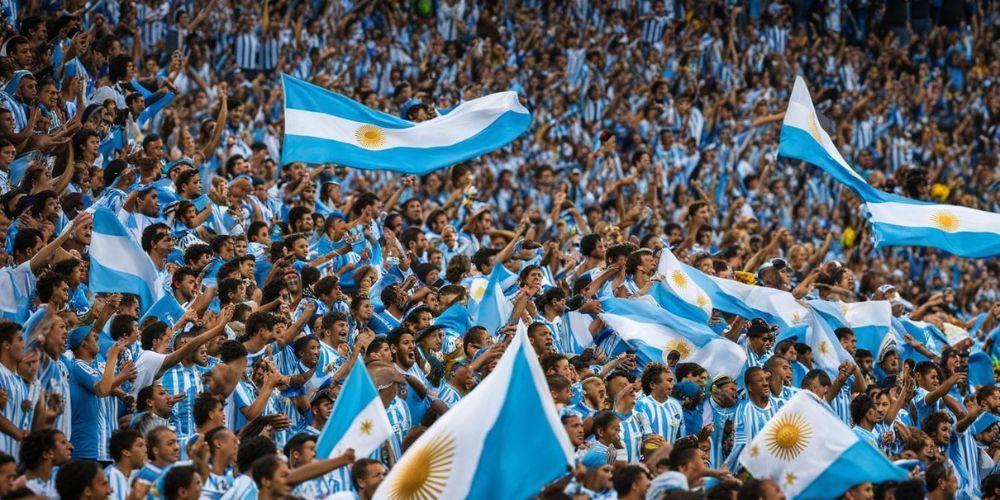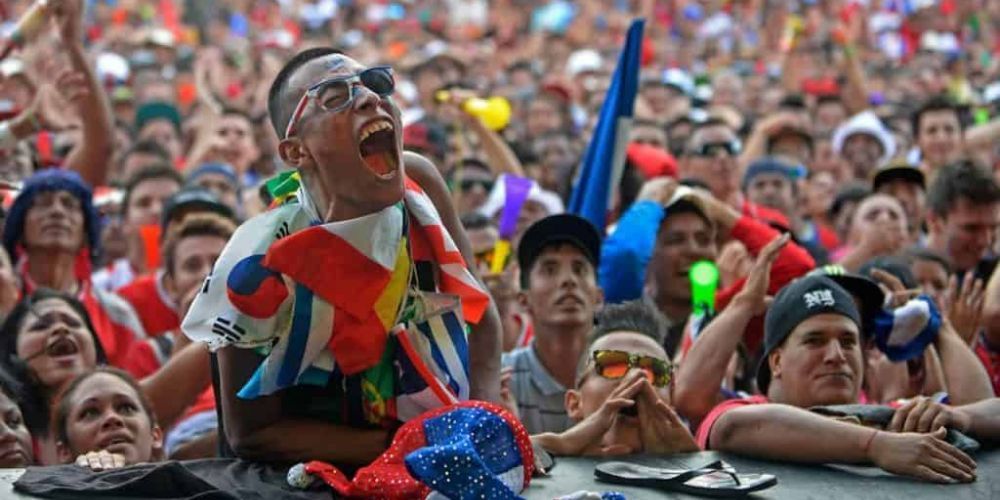Soccer's Global Impact: How the Beautiful Game Shapes Culture and Society
August 15, 2024
Soccer is not just the world’s most popular sport; it is an intricate thread woven into the fabric of global society. From bustling streets of São Paulo to quiet alleys in Rome, soccer's accessibility—only needing a ball and some open space—enables millions to play and connect daily. This simplicity has helped create an astounding 4 billion strong fan base worldwide, with events like the FIFA World Cup capturing over 3.5 billion viewers in 2018 alone.
Yet beyond mere numbers lies soccer's deeper impact—the ability to foster community bonds and transcend cultural barriers. In cities like Barcelona or Manchester, local clubs are pillars of society influencing everyday life and local traditions. International fanbases thrive due to these clubs' reach on social media platforms and merchandise sales. Through extensive research including case studies from varied regions and expert insights, we dive deeper into how this beautiful game becomes a powerful cultural bridge connecting people around the globe.
Soccer has a profound impact on global culture, shaping identities, creating shared experiences, and fostering national pride. It has the power to unite people from diverse backgrounds, bridge cultural divides, and influence various aspects of popular culture such as music, fashion, art, and social issues.

Soccer's Worldwide Popularity
Soccer isn't just a game; it's a cultural phenomenon that unites people across continents, languages, and traditions. The sport's enormous popularity can be attributed to its simplicity - all that's needed is a ball and some open space. This accessibility means that almost anyone can play, regardless of age or economic status. An estimated 4 billion soccer fans worldwide attest to the sport's vast reach, captivating the hearts of billions of people across the globe.
What's truly remarkable about soccer is its ability to transcend barriers. It doesn't matter where you come from or what language you speak; the love for the game is a universal language in itself. Families gather around their TVs or head to the nearest café to watch matches, friends meet up at local fields for pickup games, and communities celebrate together during major tournaments. Soccer brings people together, fostering a sense of camaraderie and shared passion that knows no bounds.
During the 2018 FIFA World Cup, over 3.5 billion people tuned in to watch the tournament, nearly half of the entire global population at the time—truly capturing the world's attention! The World Cup, held every four years, stands as a testament to soccer's unrivaled appeal. The tournament captivates audiences like no other sporting event, drawing fans from all corners of the earth. It goes beyond mere competition; it becomes a shared experience that ignites camaraderie and friendly rivalries among nations.
The array of emotions experienced during a World Cup goes beyond mere sporting competition. From the jubilation of victory to the heartbreak of defeat, these moments reinforce the human connection fostered through soccer—a connection rooted in collective joy and shared experiences.
Soccer’s ability to captivate such an immense audience underscores its status as a global unifier. But there's more to this beautiful game than just entertainment—it permeates culture, shapes identities, and fosters a sense of belonging unlike any other sport.
As we explore how soccer intertwines with diverse cultures and societies, we'll discover how this beautiful game leaves an indelible mark on the world stage.
Cultural Connections Through Soccer
Soccer possesses an incredible ability to unite people from all walks of life, transcending language, religion, and nationality. When you step onto a soccer field, your identity is not defined by these aspects—rather, it's shaped by your love for the game. The sport forms its own universal language, where the sound of a referee's whistle or the roar of a crowd holds the same meaning whether in Brazil, Spain, or Japan.
Local clubs play a pivotal role in shaping cultures around the world. Take Rio de Janeiro for instance - soccer isn't just a sport there; it's a way of life. The local clubs aren't just teams; they represent neighborhoods and historical rivalries that have been passed down through generations. In Spain, FC Barcelona isn't just a football club; it's a symbol of Catalan identity and has played a significant role in politics and society over the years.
"Soccer isn't just a game; it's about belonging to something bigger than yourself." - Antonella, lifelong soccer fan
Moreover, international clubs like Manchester United and Real Madrid serve as global ambassadors of their respective cultures, influencing fashion, music, and social trends worldwide. Just look at how their jerseys and merchandise are worn by millions of fans around the world. This exemplifies how deep-rooted cultural connections are built through soccer, transcending borders and uniting individuals under one common passion.
In contemporary society, social media platforms further amplify these connections, enabling fans to share their love for the sport with others thousands of miles away. The digital realm becomes a melting pot where diverse cultures converge with a mutual interest in soccer.
Soccer is more than just a game—it's a way for people to find common ground beyond their differences, forming a unified global community that celebrates diversity while embracing unity through this beautiful game.
As we've explored the profound cultural impact of soccer, now let's shift our focus to examine its extensive influence on economies and financial landscapes.
Soccer's Economic Influence
Soccer isn't just a game; it's also big business. The economic power of soccer is staggering—it's a multi-billion dollar industry that influences not only global markets but also local economies around the world. Major leagues like the English Premier League, La Liga, and the Bundesliga aren't just about what happens on the field—they're also about what happens in the boardroom and on the balance sheet.
The English Premier League: A Financial Juggernaut
The English Premier League is an excellent example of this financial might. The broadcasting rights alone are worth an estimated £9.2 billion for a three-year period from 2019 to 2022. This means that just for showing the games on TV and online, companies were willing to pay over £3 billion per year. These figures showcase not just the popularity of soccer, but also its profitability.
Impact on Local Economies
The financial clout extends beyond major organizations and giant corporations; it has a palpable effect on local economies. When matches take place, it's not just the stadium that benefits. Hotels, restaurants, retail stores, transportation services, and other local businesses all see an increase in customers and revenue due to soccer matches. It's like a ripple effect—money flows through communities because of the sport.
Consider smaller cities that host soccer matches. On matchdays, local hospitality businesses experience a surge in demand—from hotels being fully booked to restaurants enjoying bustling trade. This surge in tourism and commercial activity injects a much-needed boost to local economies.
Broadcasting deals, merchandise sales, and sponsorship agreements all contribute to this financial impact. When clubs negotiate these deals, they're not just influencing their own financial health; they're also impacting countless businesses and individuals in their surrounding areas. This demonstrates how deeply ingrained soccer is in various economies and industries.
Soccer's economic influence doesn't stop at broadcasting rights and merchandise sales; it permeates every level, from major international deals to the small businesses operating in host cities.
Social Benefits of Soccer
Soccer isn't just a game played by kicking a ball; it's an activity that unites people, promotes physical fitness, and cultivates a sense of community. The influence of soccer extends far beyond the pitch, reaching into communities around the world, providing an avenue for personal growth, teamwork, and empowerment through engaging activities and initiatives.
Let's start with physical fitness. Soccer is a sport that requires continuous movement, sprinting, and endurance, encouraging cardiovascular health, agility, and strength. By actively participating in soccer, individuals can maintain an active and healthy lifestyle while also enjoying the exhilaration of competition.
The "Football for Hope" initiative by FIFA is an exemplary program harnessing the power of soccer to address critical social issues like health, education, and inclusion. Through this initiative, soccer becomes a catalyst for positive change in communities worldwide. The program uses soccer to advocate for gender equality, empower individuals, and strengthen community bonds.
Moreover, grassroots soccer programs are instrumental in teaching young players life skills such as discipline, resilience, and cooperation. These programs go beyond soccer techniques and drills to instill values that are invaluable off the field.
Encouraging girls' participation in the sport contributes to breaking down traditional gender barriers. By fostering gender equality early on through sports participation, soccer works as a powerful tool for promoting inclusivity and diversity.
The power of soccer lies not only in the game itself but also in its ability to unite people from diverse backgrounds. Local clubs and events bring individuals together, fostering a strong sense of community spirit. This shared passion for soccer creates opportunities for individuals to bond over common interests and form lasting connections beyond the field.
Through these multifaceted social benefits – from physical fitness and personal growth to gender equality and community engagement – it's clear that soccer plays a significant role in shaping positive outcomes within societies globally.
Global Icons of the Sport
When we talk about soccer's global impact, names like Lionel Messi, Cristiano Ronaldo, and Neymar quickly come to mind. These players are not just athletes; they're global icons whose influence extends far beyond the pitch. They've captured the hearts and imaginations of millions of fans around the world with their exceptional skill and remarkable achievements. But what sets them apart is their ability to shape and influence popular culture on a global scale.
The influence of these players goes well beyond their performances in matches. They've become trendsetters, impacting fashion, advertising, and even shaping conversations on social media platforms. Take Cristiano Ronaldo, for instance. With over 500 million followers across social media channels, he wields immense influence as a brand ambassador. His reach extends to fashion endorsements, product collaborations, and charitable initiatives. It's a testament to soccer's capacity as a cultural force when figures such as these impact industries well beyond sports.
In the fashion world, these players are often regarded as style icons, with their clothing choices and personal brands influencing trends globally. From tailored suits to casual wear, their fashion sense resonates with millions of followers who seek to emulate their style. This broader influence has transformed them into more than just athletes; they have become symbols of aspiration and inspiration for fans worldwide.
Moreover, their impact extends to advertising and marketing realms. Companies recognize the value of associating their brands with these iconic figures, leveraging their popularity to resonate with diverse audiences across continents. Whether it's featuring in commercials or endorsing products, these players have proven to be invaluable assets in capturing consumer attention and driving brand engagement.
In the rapidly evolving landscape of social media, these players have redefined the concept of influence. Their online presence goes well beyond statistics and match highlights; it's an integral part of contemporary pop culture. Through captivating content, engaging with fans, and sharing insights into their personal lives, they've forged connections that transcend geographical boundaries. The impact of this digital influence underscores how soccer isn't confined to stadiums—it permeates every facet of modern life.
Understanding the impact of these global icons provides insight into how soccer has organically woven itself into the fabric of popular culture, transcending geographical barriers and influencing diverse aspects of modern society.

Soccer and Political Activism
Soccer, often viewed as just a game, has proven to be an influential force in advocating for meaningful social and political reform. The beautiful game has provided players and fans with a unique platform to speak out on issues that resonate far beyond the realm of sports.
An example is Marcus Rashford, who used his platform as a prominent player to advocate against child food poverty in the UK. His relentless campaign drew global attention and inspired real policy changes, demonstrating the influential role soccer can play in addressing critical societal issues.
The resounding impact of soccer as a catalyst for change was also evident in the widespread support for racial equality movements such as Black Lives Matter within the sport. Players and teams across different leagues took a stand, using their visibility to amplify calls for racial justice. These actions transcended the boundaries of sports, sparking vital conversations and prompting tangible policy adjustments aimed at addressing systemic racial inequality.
In light of these instances, it becomes evident that soccer isn't confined to stadiums and match days; it is entwined within the complex fabric of society, lending its voice to effect change on significant social and political issues.
Moreover, the powerful symbolism associated with soccer lends weight to these advocacy efforts. When high-profile players or teams take a stand, it resonates deeply with millions of fans around the globe. This collective solidarity underscores the magnitude of soccer's influence in shaping attitudes and igniting action towards progressive societal transformations.
The far-reaching impact of these actions reiterates the importance of recognizing soccer as not just a game but as a compelling conduit for driving meaningful societal change.

The Role of Soccer in Diplomacy
Soccer has always held an unspoken power to bring people and nations together. It's more than just a game; it's a global language that transcends borders, cultures, and politics. When it comes to diplomacy, soccer presents a unique opportunity to foster goodwill and understanding between nations.
International matches and tournaments provide platforms for cultural exchange, camaraderie, and cooperation between countries with complex relationships. The very act of hosting or participating in these events promotes interaction and dialogue among diverse cultures, contributing to a deeper sense of mutual respect and understanding. It's not just about the game; it's about the connections forged on and off the field.
One historical example that showcases the diplomatic potential of soccer is the infamous "Football War" truce between El Salvador and Honduras in 1969. Following tension between the two countries aggravated by a World Cup qualifier match, the ensuing conflict was halted after the intervention of the Organization of American States. This de-escalation illustrates how soccer had inadvertently become embroiled in political tension, yet also played a role in bringing about peace.
In 2018, North Korea extended an invitation to a South Korean team to participate in a friendly match as part of ongoing diplomatic efforts. This gesture underscored the potential for sports, particularly soccer, to thaw geopolitical tensions and facilitate dialogue between estranged nations.
Soccer’s unique ability to unite nations on the field while also providing a platform for reconciliation and connection off the field is a testament to its enduring influence on international relations.
The unparalleled role of soccer in fostering global connections and diplomacy is a testament to its immense impact beyond the realm of sports. Soccer continues to serve as a powerful force in shaping culture, society, and international relations.
How does soccer influence cultural identity and community bonding?
Soccer has a profound impact on cultural identity and community bonding across the globe. As a sport played and loved by millions, it transcends national boundaries and unites people from diverse backgrounds. Local soccer clubs often become a focal point of community pride and solidarity, fostering a sense of belonging and shared identity among fans.
In many countries, soccer matches serve as a gathering place for community members to come together, celebrate, and support their local teams. The sport encourages social interaction, creates lasting friendships, and provides a common language that transcends cultural and linguistic barriers. Soccer events, such as the FIFA World Cup, showcase national pride and bring together supporters who share a love for the game, promoting unity and cultural exchange.
What are the economic impacts of soccer on local and global economies?
Soccer significantly contributes to both local and global economies through various channels. At the local level, soccer clubs generate revenue through ticket sales, merchandise, sponsorships, and broadcasting rights. This economic activity supports jobs within the community, from stadium staff to local businesses that benefit from increased foot traffic during matches.
On a global scale, major soccer tournaments like the FIFA World Cup and the UEFA Champions League drive substantial economic impact by attracting tourism, infrastructure investment, and international media attention. Host countries often experience a boost in economic activity due to increased spending by tourists and the creation of jobs related to event organization and infrastructure development. Additionally, the global soccer industry supports a wide range of businesses, including sports apparel companies, broadcasters, and marketing firms.
How does soccer address social issues and promote social change?
Soccer is a powerful tool for addressing social issues and promoting social change worldwide. It provides a platform for raising awareness about important social issues, such as gender equality, racial discrimination, and social inclusion. Soccer organizations and players often engage in initiatives to support marginalized communities, promote education, and encourage positive societal values.
Programs like FIFA’s Football for Hope and various grassroots initiatives use soccer as a vehicle for social change by providing access to the sport in underserved communities, promoting peacebuilding, and encouraging healthy lifestyles. Soccer’s ability to bring people together and its universal appeal make it an effective medium for conveying important social messages and inspiring collective action.
Check out the latest guides on soccer
Author: William Flaiz










